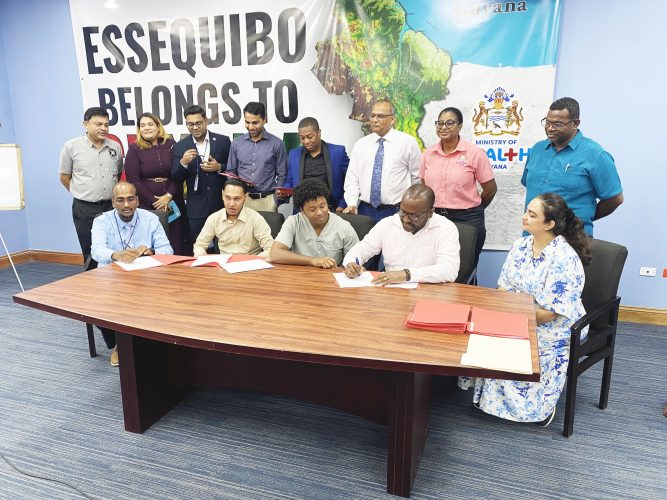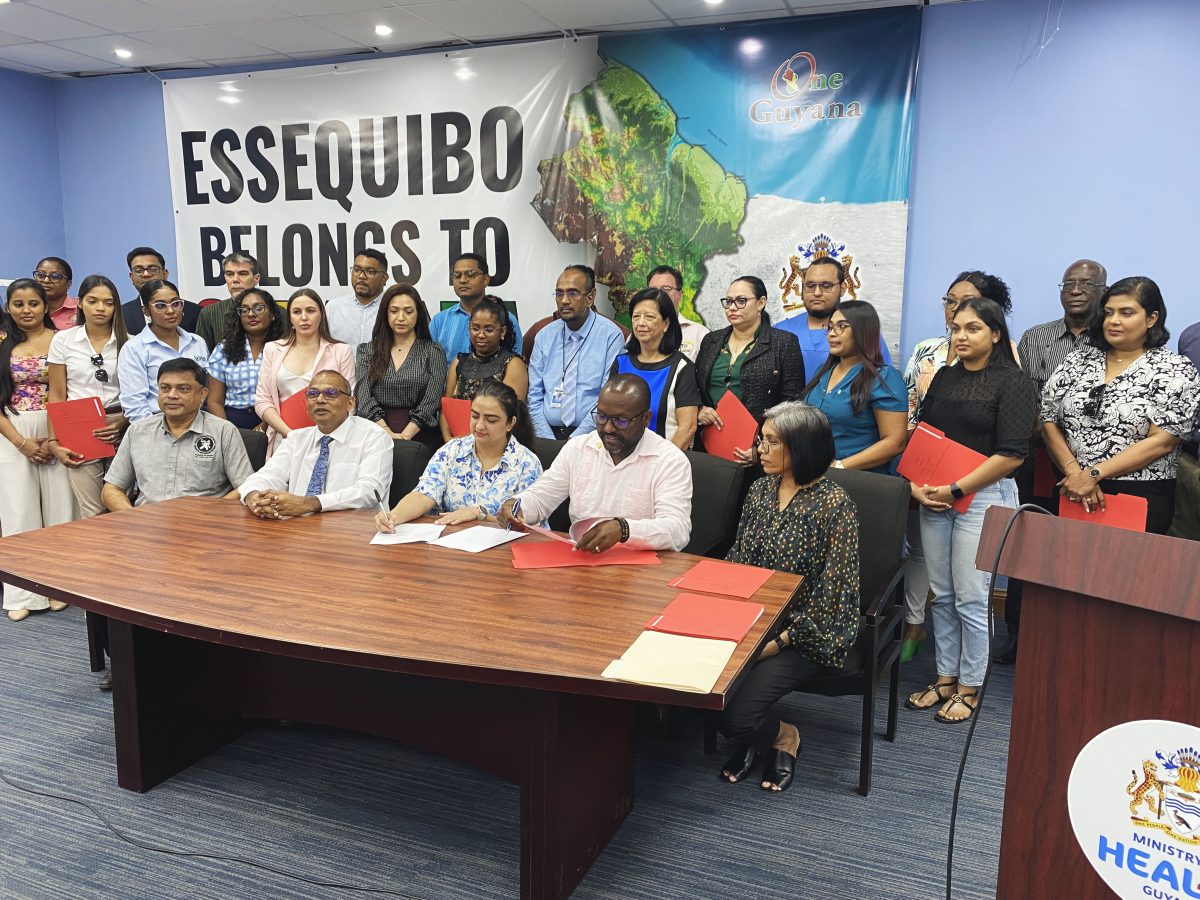The Ministry of Health (MoH), in collaboration with privately-owned medical facilities, on Friday signed a Memorandum of Understanding in preparation for the official launch of the Govern-ment of Guyana’s HPV, eye testing and spectacles programmes.
The Hinterland Coordinator, Michael Gouveia, explained that visits to the several regions highlighted the need for the eye screening programme along with assistance to purchase spectacles. Similarly, the HPV (human papillomavirus) programme focuses on meeting the needs of women in helping with diagnosis and screening.
Director of Non-communicable Diseases and Mental Health, Dr Lachmie Lall, in her overview on the elimination of cervical cancer, outlined the World Health Organisation target called 90:70:90. It represents 90 per cent of girls vaccinated against HPV by age 15; 70 per cent of women screened by age 35, and again by age 45; and 90 per cent of people identified with cervical disease treated.

Lall further explained that the MoH formulated an action plan in April to help reach the target by 2030 with the goal being to screen approximately 211,000 women in the next four years. The private medical facilities were invited to liaise with the ministry to help reach the target with the focus on HPV as the first phase of the programme. A voucher valued at $8,000 will be given to women between the ages of 21 to 65 for HPV testing at the private medical facilities involved. Woman living in the hinterland regions are expected to benefit as the ministry works on a strategic plan to have the samples transported to the facilities and returned after testing.
“It’s a series of steps that we’ve worked out with the private sector and how we are going to go forward with this. For our partners, we have five private agencies that will be providing the HPV testing. This will happen in the form of a voucher at the cost of $8,000 that will be given to all women between the ages of 21-65. Those vouchers will be redeemable at the five private facilities.”
The eye screening and spectacles programme will be launched on Tuesday, while the HPV programme will be launched on Friday. The programmes were described as the first of their kind with collaborative efforts from the private sector. Medical facilities that will be accommodating the HPV programme include New Vision Medical Centre, Dr. Balwant Singh Hospital, Eureka Labs and Woodlands Hospital. Some of the facilities that will be accommodating the eye programme include, Da Silva’s Optical, Optique Vision Care, Eye Max, Miracle Vision, Opti-cal World, Ming’s Optical and Dr. Balwant Singh Hospital.
Epidemiologist and Inter-national Health Regulations NFP Coordinator, Dr Anand Persaud, remarked that vouchers will be provided for persons who are 18 years and younger and 65 years and older. The relevant information must be provided digitally in a form of an excel template that can be submitted via email or a Google sheet that can be accessed by the MoH. Persaud highlighted that that format will be used for epidemiological purposes and accountability of the vouchers for audit information. The spectacle voucher is valued at $15,000.
Minister of Health, Dr Frank Anthony, said that it is the first time the MoH will be working with such a large private sector group. In an effort to foster a good relationship, Anthony said meetings will be held frequently to address issues that may arise. The private sector is expected to serve persons from a broad spectrum of society and areas that might be deemed too difficult to be accessed by the ministry in a timely manner. The eye care programme is a two-stage process, where the voucher of $8,000 for screening will first be distributed. Once deemed a spectacle issue, a second voucher of $15,000 will be distributed to contribute to the total cost.
Anthony highlighted that other eye-related issues such as cataracts can also be facilitated through a different programme to help meet the needs of people.
“We are not covering the full cost because if the spectacles cost $20,000 or $30,000, we are only contributing $15,000 to that cost. We are pioneering in a sense because if these types of projects work, where we can work with the private sector to be able to improve efficiency of our services, then this can probably lead to other ways of other types of partnerships…The successes that we want to achieve here would demonstrate that it would allow us to do maybe other types of projects”, he said.
A school health programme will be rolled out to target eye care, ear care, medical, and dental checkups for children. These programmes will be available in the Nursery, Primary and Secondary schools. The ministry is in the process of building an electronic health record system that is facilitated by a smart card that will provide the past medical history of an individual at public institutions.









